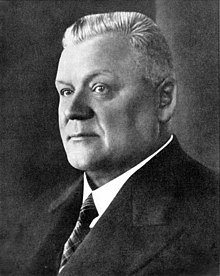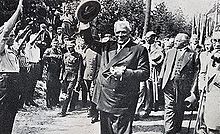Kārlis Ulmanis
Kārlis Ulmanis (* 23 August July / 4 September 1877 greg. In Bērze , Kurland Governorate , Russian Empire ; † September 20, 1942 in Krasnowodsk , Soviet Union ) was a Latvian politician . He was several times Prime Minister of Latvia (1918–1921, 1925–1926, 1931, 1934–1940), from 1934 with dictatorial powers, from 1936 also President of Latvia.
Education
Ulmanis studied agricultural science at the ETH Zurich and the University of Leipzig and then worked as an author, lecturer and agricultural manager in Latvia. He was already politically active during the revolution of 1905 and was briefly imprisoned in Pskov prison . To avoid being arrested again, Ulmanis left the Russian Empire , to which Latvia belonged at the time. During this time he studied at the University of Nebraska in the USA and obtained a Bachelor of Science degree in agricultural science. After he briefly worked as a lecturer at the university, Ulmanis moved to Houston ( Texas ), where he obtained a dairy farm had acquired.
In 1913 Ulmanis returned to Latvia from exile after learning of a general amnesty issued by the Tsar . In 1917 he was a co-founder of the Latvian Farmers' Union , one of the most important political parties in what would later become Latvia.
Prime Minister
After the First World War , Ulmanis was one of the founders of the Latvian People's Council ( Latvijas Tautas padome ), which was formed on November 17, 1918 and the day after proclaimed independence from Russia. Ulmanis was the first head of government of Latvia (until June 18, 1921). A constituent assembly ( Satversmes sapulce ) constituted the state as a parliamentary democracy in 1920 . Ulmanis was later again from December 24, 1925 to May 6, 1926, from March 27, 1931 to December 5, 1931 and from March 17, 1934 Prime Minister. He also temporarily headed the ministries for war, agriculture and supply. In 1923 he was also chairman of the board of the Latvian farmers' bank (Latvijas zemnieku banka).
dictator
In a coup d'état on May 15, 1934 , Ulmanis dissolved the Saeima parliament in his position as head of government and established an authoritarian regime. After the term of office of President Alberts Kviesis had expired, Ulmanis unified the office of President and Prime Minister in 1936 contrary to the constitution.
Despite this political coup, Ulmanis enjoyed popularity among the population. During his reign, Latvia's development made significant progress. Education policy was given special priority. Latvia achieved one of the highest literacy rates in Europe. Britain and Germany became the country's main trading partners, while trade with the USSR was reduced. While many countries suffered from the global economic crisis , Latvia was able to increase its gross national product and export volume during this time .
World War II and death
In 1939, Germany and the Soviet Union signed the German-Soviet non-aggression pact , in whose secret additional protocol they de facto divided Eastern Europe among themselves. Ulmanis had long feared this. In 1940 Latvia was finally occupied by the Soviet Union. Ulmanis called on the Latvians not to offer any resistance, which would have been doomed to failure anyway due to the military superiority of the Soviets. Even today, the sentence “I will stay in my place and you will stay in your place” from his radio address at the beginning of the occupation is known to many Latvians.
Although Ulmanis had received permission to travel to Switzerland , according to information from the US State Department , he was arrested and deported by the Soviets. It was only after the collapse of the Soviet Union that details about his fate became known: Ulmanis died in a prison in Krasnowodsk , today's Turkmenbaşy, in Turkmenistan during the Second World War .
souvenir
Ulmanis is still popular in his homeland. Many Latvians see it as a symbol of their country's independence in the interwar period or associate it with Latvia's economic boom in the 20th century . However, critics note that anyone who dissolved parliament in order to establish an authoritarian regime cannot be considered a positive figure in Latvian history, regardless of how mild and economically successful that regime has been. A sign of Ulmanis' continued popularity in Latvia may be the fact that his great-nephew Guntis was elected President of the newly independent Republic of Latvia in 1993.
literature
- Karl Heinz Gräfe: From the thunder cross to the swastika. The Baltic States between dictatorship and occupation. Edition Organon, Berlin 2010, ISBN 978-3-931034-11-5 , short biography p. 441.
- Ilgvars Butulis: History and Politics. The authoritarian regime of Kārlis Ulmanis 1934-1940. Research Problems and Solutions . In: Svetlana Bogojavlenska, Jan Kusber (ed.): Tradition and a new beginning. Research on the history of Latvia at the turn of the 20th and 21st centuries. Small commemorative publication for Erwin Oberländer . LIT, Berlin 2014, ISBN 978-3-643-12732-7 , pp. 171-183.
Web links
- Literature by and about Kārlis Ulmanis in the catalog of the German National Library
- Newspaper article about Kārlis Ulmanis in the press kit 20th century of the ZBW - Leibniz Information Center for Economics .
- Article Kārlis Ulmanis in the Great Soviet Encyclopedia (BSE) , 3rd edition 1969–1978 (Russian)
| personal data | |
|---|---|
| SURNAME | Ulmanis, Kārlis |
| BRIEF DESCRIPTION | Latvian politician |
| DATE OF BIRTH | September 4, 1877 |
| PLACE OF BIRTH | Bērze , Courland Governorate , Russian Empire |
| DATE OF DEATH | September 20, 1942 |
| Place of death | Krasnovodsk , Soviet Union |



